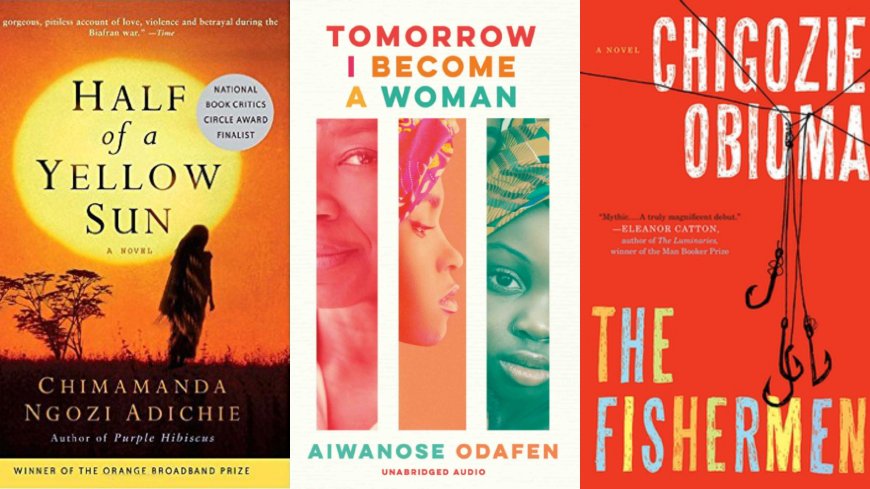5 Nigerian Books Everyone Should Read and Why
Discover five essential Nigerian books that capture the country’s rich history, culture, and societal struggles. From colonialism to war, gender roles, and family dynamics, these novels offer deep insights into Nigeria’s past, present, and future.

Nigeria has a rich literary tradition. Through fiction, writers have explored themes of identity, colonialism, war, tradition, and societal change, helping the world connect with its history and cultural evolution in powerful ways. They allow you to see Nigeria through different lenses, making you reflect, question, and sometimes even rethink what you thought you knew.
Great books have a way of sticking with you long after you’ve turned the last page, and Nigerian writers have mastered the art of storytelling in a way that feels personal and universal. If you’re looking to explore Nigerian literature, some books stand out as must-reads, not just because they’re famous, but because they truly capture the essence of Nigeria’s past, present, and future.
In this article, I have listed five books that everyone should read, not just for their literary brilliance but for the deep insight they provide into Nigerian life and society.
Tomorrow Died Yesterday - Chimeka Garricks (2011)
Chimeka Garricks’ Tomorrow Died Yesterday is a gripping novel set against the backdrop of Nigeria’s troubled Niger Delta region. The book tells the story of four friends – Doye, Amaibi, Kaniye, and Tubo, whose lives are shaped by the complex socio-political and environmental realities of the oil-rich region. The Niger Delta is an area marked by extreme poverty, despite its natural wealth and the novel captures the harsh realities of living in an area affected by corruption, exploitation, and environmental degradation.
At its core, Tomorrow Died Yesterday is about friendship, activism, and the quest for justice. Garricks paints a raw and realistic picture of the Niger Delta’s struggles, touching on the impact of the oil industry on local communities. The book raises critical questions about corporate exploitation, government neglect, and the environmental challenges faced by the people of the region. It is a must-read for anyone interested in understanding the grassroots resistance movements in Nigeria and the consequences of unchecked power.
Half of a Yellow Sun - Chimamanda Ngozi Adichie (2006)
Chimamanda Ngozi Adichie’s Half of a Yellow Sun is a poignant and powerful historical novel set during the Nigerian Civil War (1967-1970). The book tells the story of three main characters, Ugwu, a young houseboy; Olanna, a beautiful and privileged woman; and Richard, an Englishman caught in a complex love triangle, whose lives are changed forever by the brutal conflict that devastated the country.
Through the lens of the Civil War, Adichie explores themes of love, loyalty, class, and race. The novel captures the human cost of the war, offering readers an intimate look at how the conflict affected not just soldiers but also civilians, deeply challenging personal and political ideologies. The portrayal of Nigeria’s ethnic tensions, the devastation of war, and the unyielding hope for a better future is a powerful commentary on the country’s complex history.
Half of a Yellow Sun also delves into the impact of war on individuals’ identities and relationships, offering a vivid and emotionally charged account of the horrors of conflict. It is an essential read for anyone seeking to understand the Nigerian Civil War and its long-lasting effects on the country’s politics and ethnic relations.
The Fishermen - Chigozie Obioma (2015)
The Fishermen is a tragic and gripping novel that tells the story of four, Ikenna, Boja, Obembe and Benjamin, who take advantage of their strict father's absence from home to go fishing at a forbidden local river. When a madman prophesies that the eldest brother will be killed by one of the others, their lives begin to unravel in unexpected ways. Chigozie Obioma’s debut novel is a powerful allegory of Nigeria’s postcolonial struggles, examining themes of fate, destiny, and family loyalty.
Obioma’s storytelling blends Nigerian folklore with modern psychological depth, making The Fishermen a must-read for anyone interested in family dynamics, fate, and the impact of prophecy on human choices.
Tomorrow I Become a Woman - Aiwanose Odafen (2022)
Tomorrow I Become a Woman is a deeply moving novel that explores gender roles, marriage, and patriarchy in Nigeria. The story follows a young woman, Obianuju, who struggles to navigate societal expectations in a traditional marriage. Through her journey, Aiwanose Odafen highlights issues such as domestic abuse, women’s autonomy, and the pressure to conform to cultural norms.
What makes this novel particularly significant is its honest and nuanced portrayal of the complexities Nigerian women face in their pursuit of happiness and independence. It is a must-read for those interested in feminism, gender studies, and contemporary Nigerian society.
Things Fall Apart - Chinua Achebe (1958)
No list of essential Nigerian books would be complete without Things Fall Apart. This classic novel by Chinua Achebe is one of the most important works of African literature, depicting the impact of colonialism on Igbo society through the story of Okonkwo, a respected leader whose world begins to crumble with the arrival of European missionaries.
The story examines the effects of colonialism on African societies, the clash between tradition and change, and the struggle between individual and society. Achebe’s writing provides a profound critique of colonialism while also offering an in-depth look at Igbo traditions, values, and beliefs.







